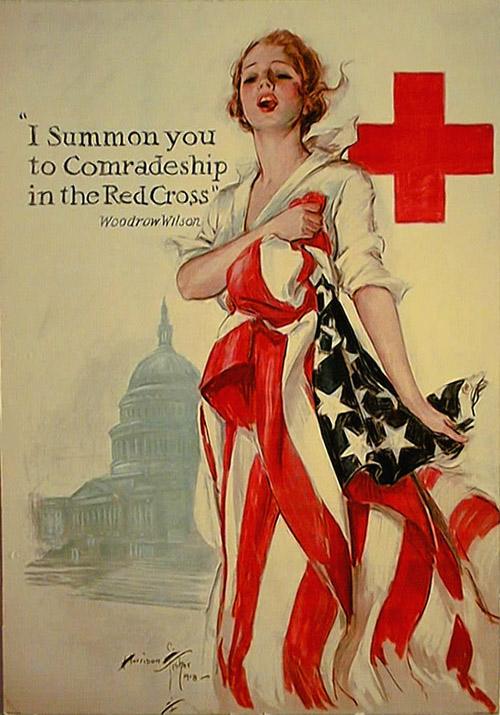
|
|
| The poster "I Summon You" presents a confused reflection of socially-constructed
perceptions of gender in early 20th-century America. The message
to be a good woman and enlist in the Red Cross combines with the portrayal
of a very sexually-charged female to send two very different messages to
the intended audience, potential Red Cross volunteers who were by and large
women. Moreover, the message and the illustrations in no way compliment
one another. Thus, the contradictions in this poster are numerous.
The portrayal of the woman in this poster is extremely sexual. She is illustrated with her mouth open, head slightly thrown back, eyes closed, and hair escaping its restraints. She looks as though she is caught in the throes of passion. In addition, the low cut shirt and flag clutched to her breast are extremely provocative. Historically, there have been two roles for women, Mary and Eve. The woman who fits into the paradigm of Mary is submissive, virginal, and passive. On the other hand, the paradigm of Eve is one of uncontrolled desire (sexual or otherwise), temptation, and heedlessness. In her wanton position, the character in this poster falls into the Eve paradigm. Further, the female image in I Summon You in no way reflects the values of the "good wife" or the "domestic angel" , which are two other historical examples of woman-as-Mary paradigms. (1) The contradiction rests in the fact that despite being portrayed as an Eve-like seductress, the intent of the poster is more suitable to a Mary-like audience. Another contradiction involves the statement, "I summon you to comradeship in the Red Cross." The quote is assertive and direct. There are no mixed signals of sexuality and submission. Rather, it is a simple statement, clearly demanding that women join the Red Cross. Such a statement removes women from the Mary/Eve paradigm by offering an image that is neither sexually charged nor submissive. Ironically, the statement is clearly denoted as issued by a man, then President Woodrow Wilson. Further, it promises comradeship to those who enlist in the Red Cross. Paradoxically, these female comrades were not even entitled to vote when this poster was issued. Further, women are not even guaranteed comradeship among other women. Thus, women are being offered comradeship by a highly sexualized image meant to appeal to men. Again, the message and the image do not coincide. Finally, irony is also greatly evident in this poster. To pose
an extremely lascivious image of a woman in front of the Capitol building
at a point when women were still disenfranchised is not only ironic but
more than a bit offensive. Such an image suggests the true place
of women in society: poster "girls" for male causes. This place
clearly does not include the Capitol building or any other seat of power
or authority.
1. Dr. Judy DeGroat, guest lecture, February 12, 1998. |